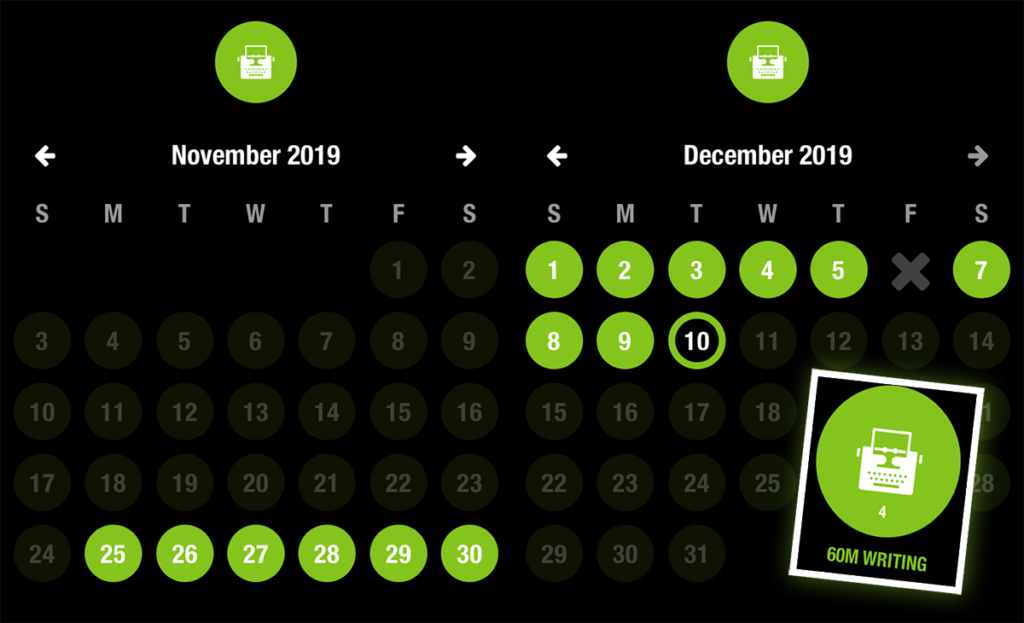
Recently finished reading Stephen King’s On Writing: A Memoir of the Craft. I probably should have read it before I wrote a book about writing? But I’m happy to report it didn’t leave me second-guessing my guidance in Writing for Designers. Just envious of King’s prose and storytelling skills.
Like many books on creative practices, much of the advice can be reduced as such:
to be the thing (e.g. writer)
do the thing (e.g. write)
and do it every day (e.g. today, and also tomorrow).
Novelists often recommend daily wordcount goals as a way of approaching the doing part. King suggests 1,000 words a day and building up from there. That makes sense to me if you’re writing a book manuscript. A book is a big hunk of marble you’ve got to chip away at daily. I’ll probably try daily wordcount goals when I’m committed to my next book.
Thing is, there’s quite a bit of non-book writing I’d like to be doing. Essays and articles and blog posts and newsletters and the like. I’ve tried wordcount goals for this kind of stuff in the past and it doesn’t work for me. Telling myself I’m going to write 1,000+ words of whatever per day has led me to write exactly that: a bunch of whatever. Hell, my first book draft was twice as long as they wanted. Quantity of words written is not the problem.
Of late I’ve been trying a different habit, and the results are encouraging. For 15 out of the last 16 days, primarily in the morning, I’ve started a one hour timer. When the timer is running, I am a writer. I am practicing being the thing.
Most of what I do during this hour is, in fact, writing words — as fast as the Gingerbread man runs, as King puts it. But I might also be editing things I’ve written, or reviewing my Ulysses and Drafts inboxes to find what I want to write next, or turning finished drafts into stuff other people can read.
Focusing on the hour instead of the output is about committing a serious part of my day toward living the life I want. When I am being studious and creative and productive – when I’m reading and thinking and making – I feel great. When I’m not, I don’t. I hope all of this work adds up to something, and helps to elevate my profile and boost my career. But even if it doesn’t, it still feels like what I am supposed to be doing.
This is a more fragile habit than a wordcount goal. I have to be honest with myself about how I’m using the hour. There are a lot of non-productive approaches to being the thing when it comes to writing: shopping for notebooks (guilty), choosing the best music to write to (guilty), researching writing apps (guilty), tweaking shortcuts and workflows (guilty), looking at a looooot of Wikipedia articles in the name of “research” (guilty). I’ve eschewed hard rules so far during the hour, but I do try to be really and truly settled before I start the timer – email checked, coffee made, bathroom visited. I also turn off Wifi. (Turning it back on here and there to grab a link or publish a post.)
The hour is harder to fit into my day than an arbitrary quantity of writing, but that’s part of what’s important about it to me. I want it to hurt a little. I want to have to change things to make it work.
Establishing good habits is hard as hell, especially going from zero to an hour a day. I hope I don’t have to adjust this approach too much going forward, but I’m going to try to be kind to myself if I do. So far it’s helped to:
- Have a supportive partner who’s also practicing this. We’ve done many of our hours together at coffee shops, and once, adorably, side-by-side on an Amtrak train.
- Go to bed a little earlier. Harder than it sounds for my dumb ass, but I’m trying.
- Set multiple alarms. A thing I didn’t expect going into this is that the writing basically has to happen in the morning or it won’t happen.
- Track my habit in the Streaks app. (It seriously KILLS me that I missed a day and I’m already eager to beat the previous 11-day best.)
Okay. Hour’s almost up. Gonna get this thing ready to publish.